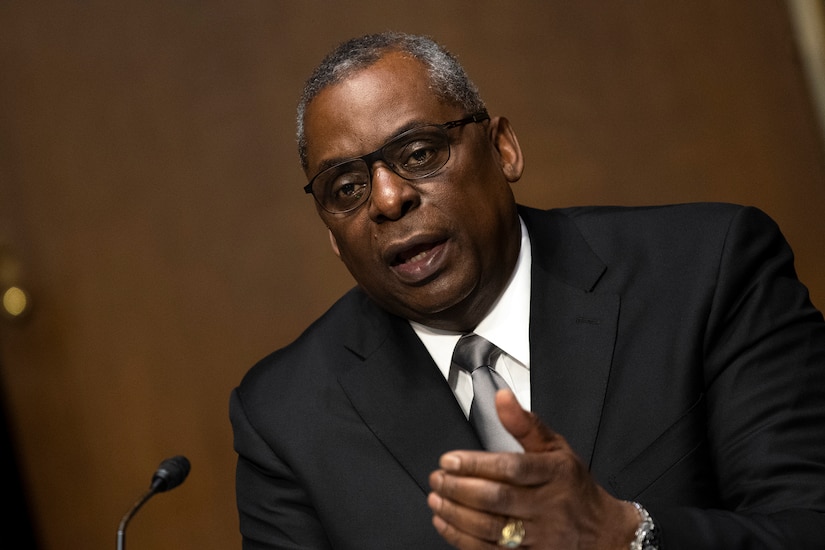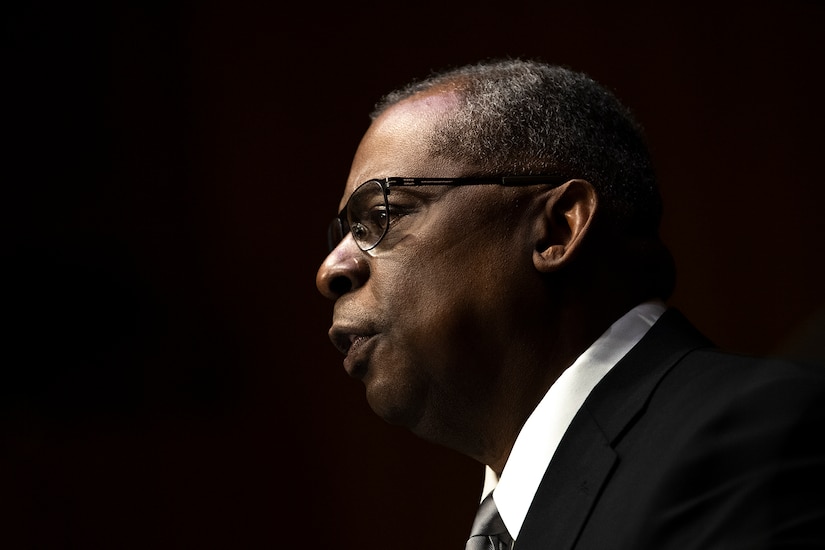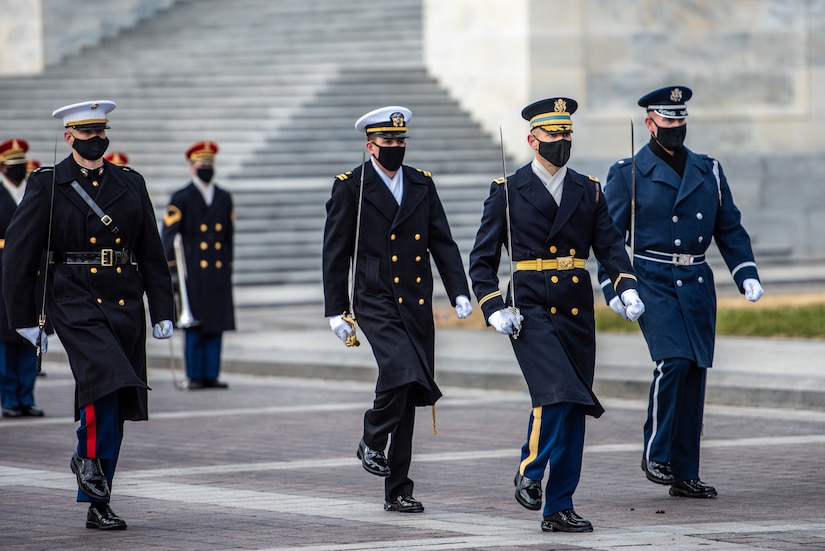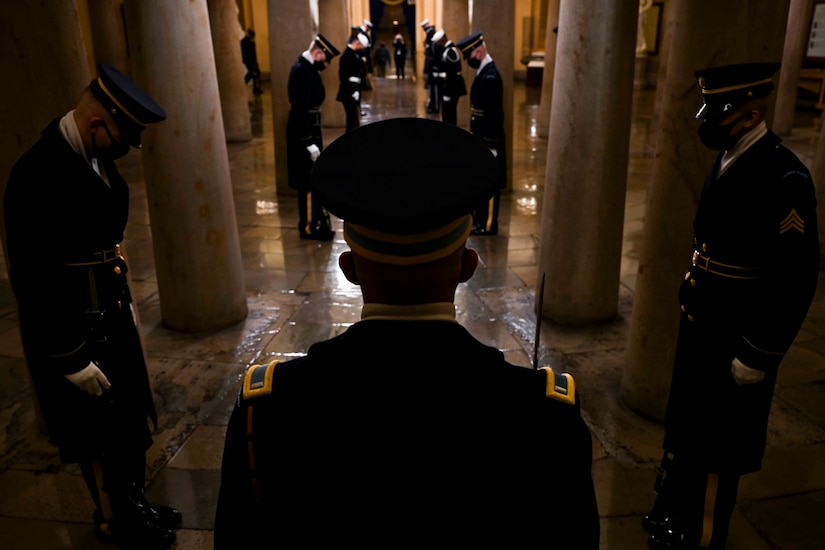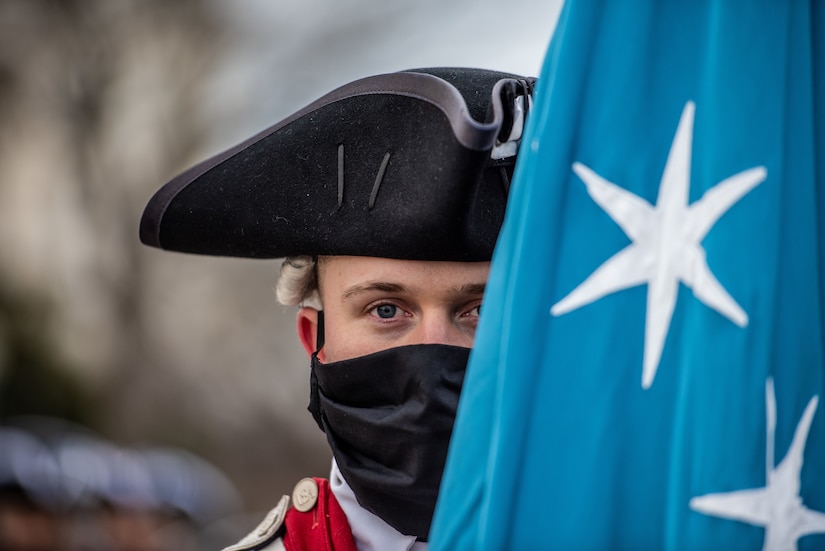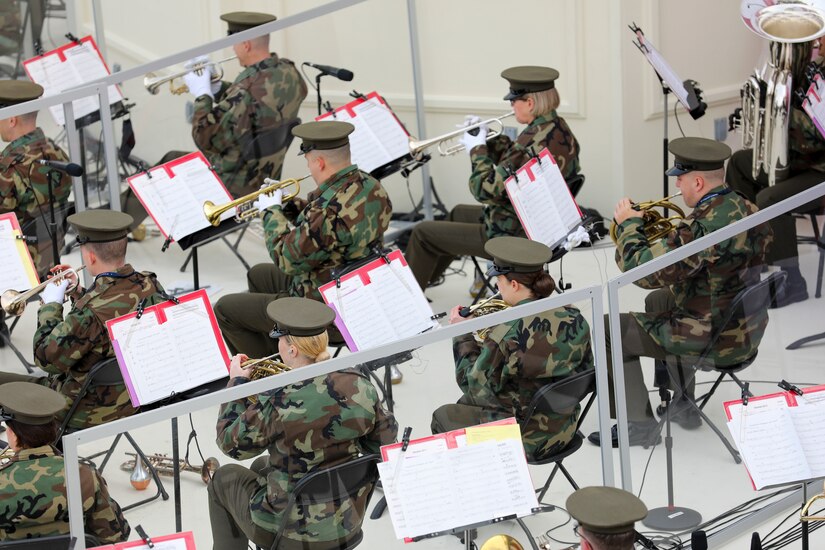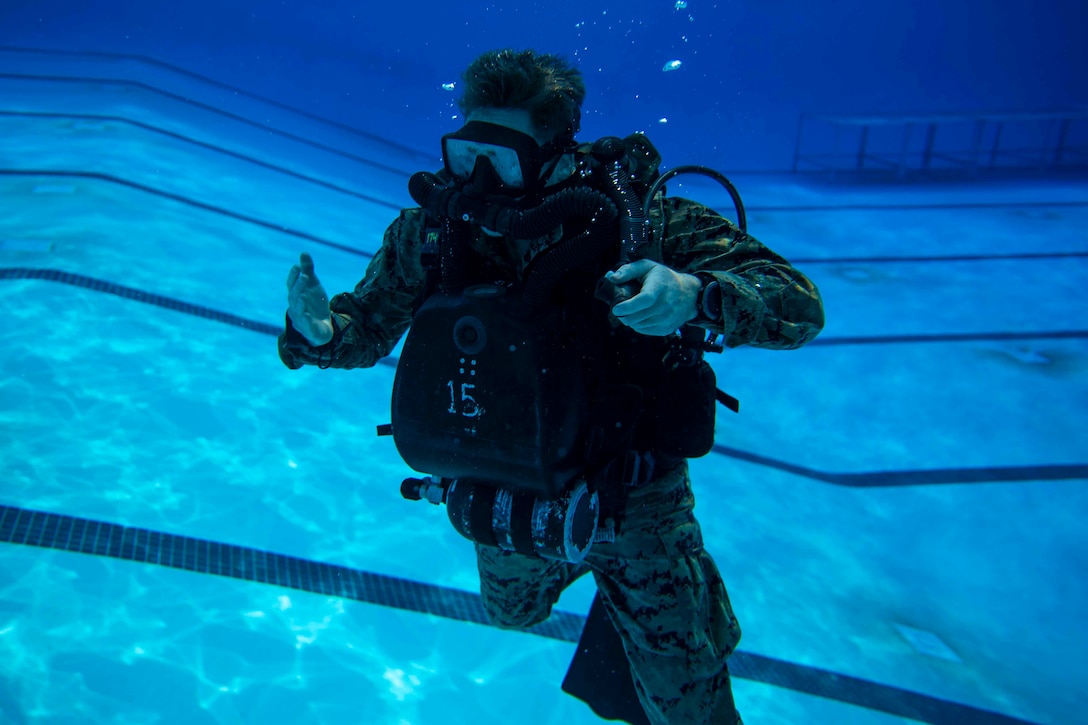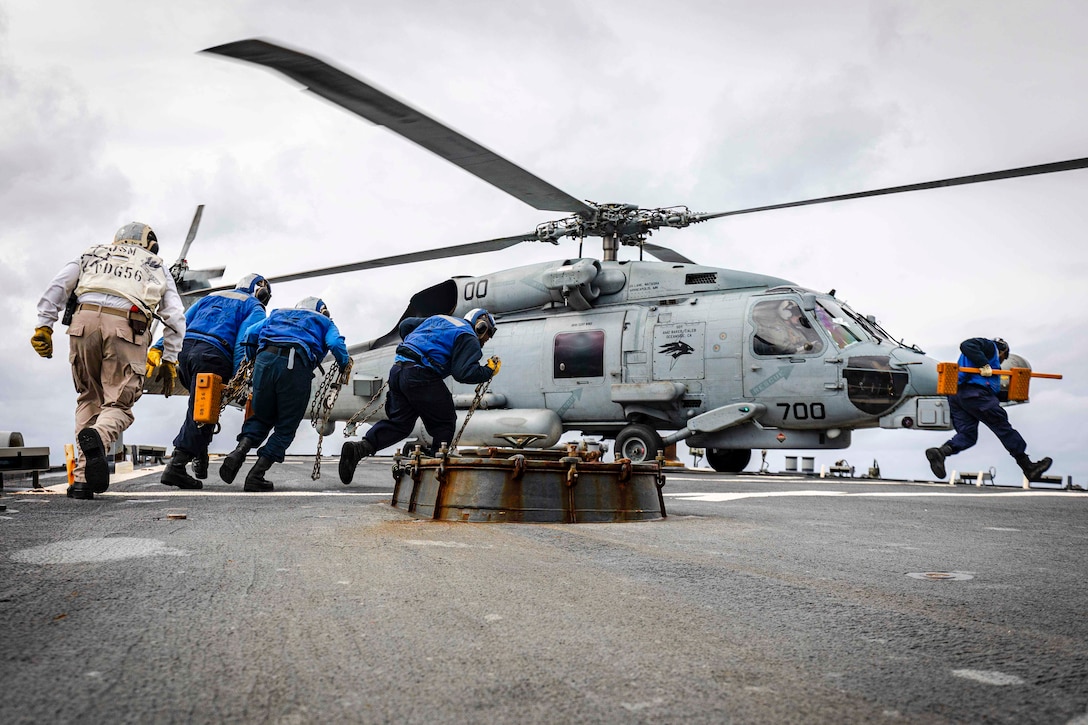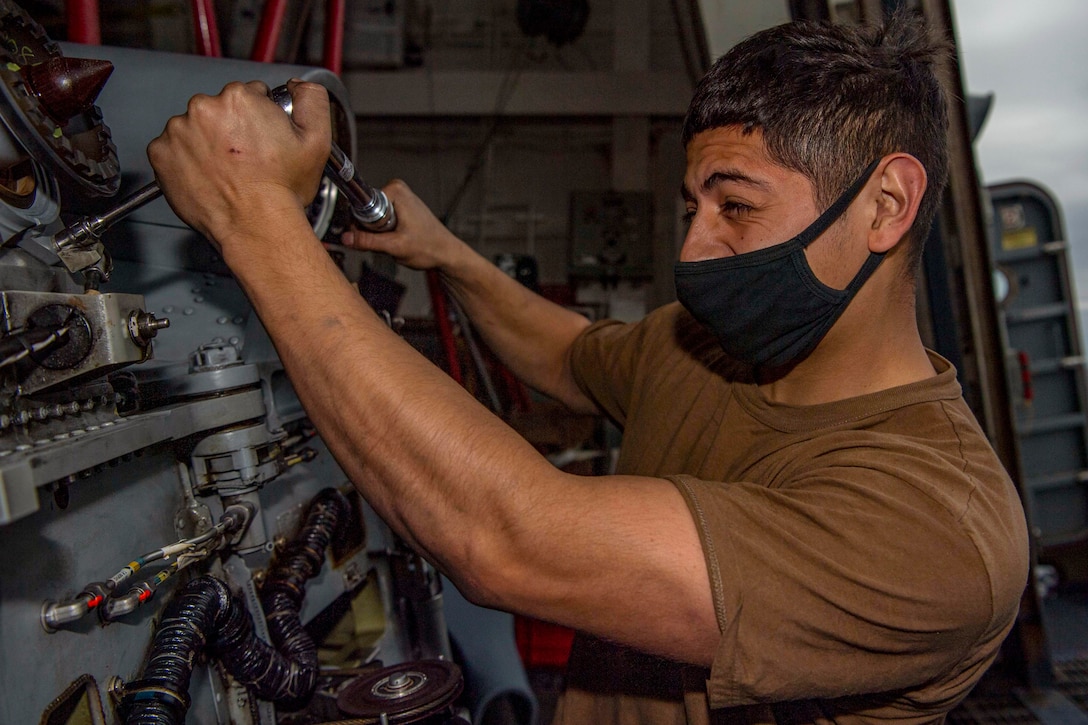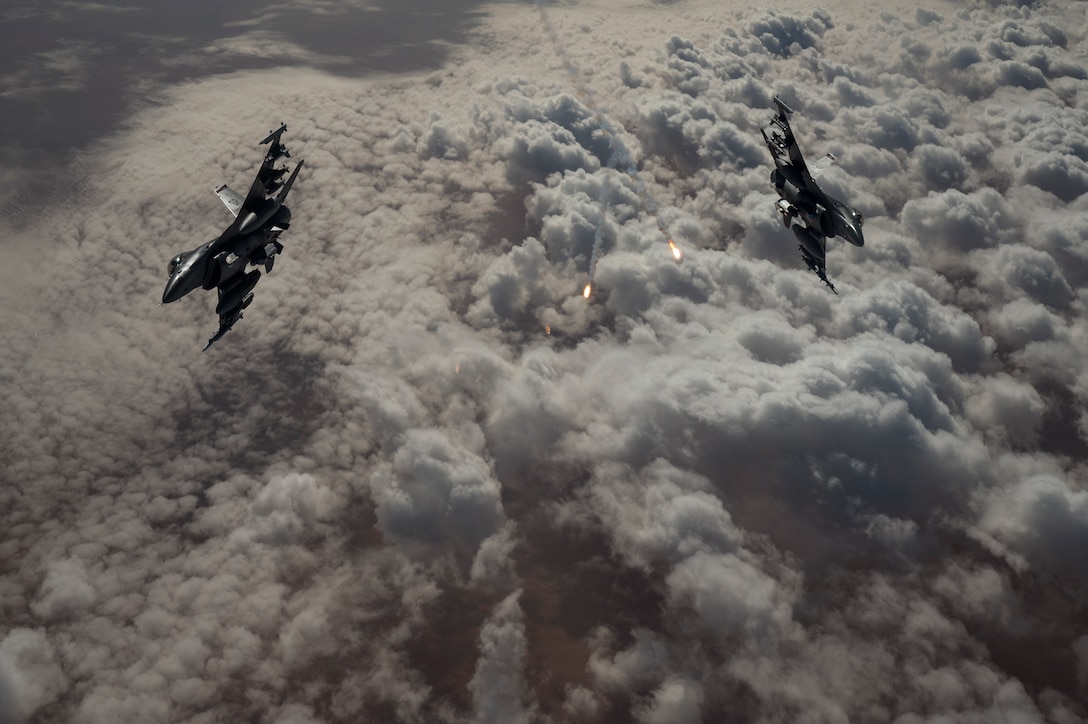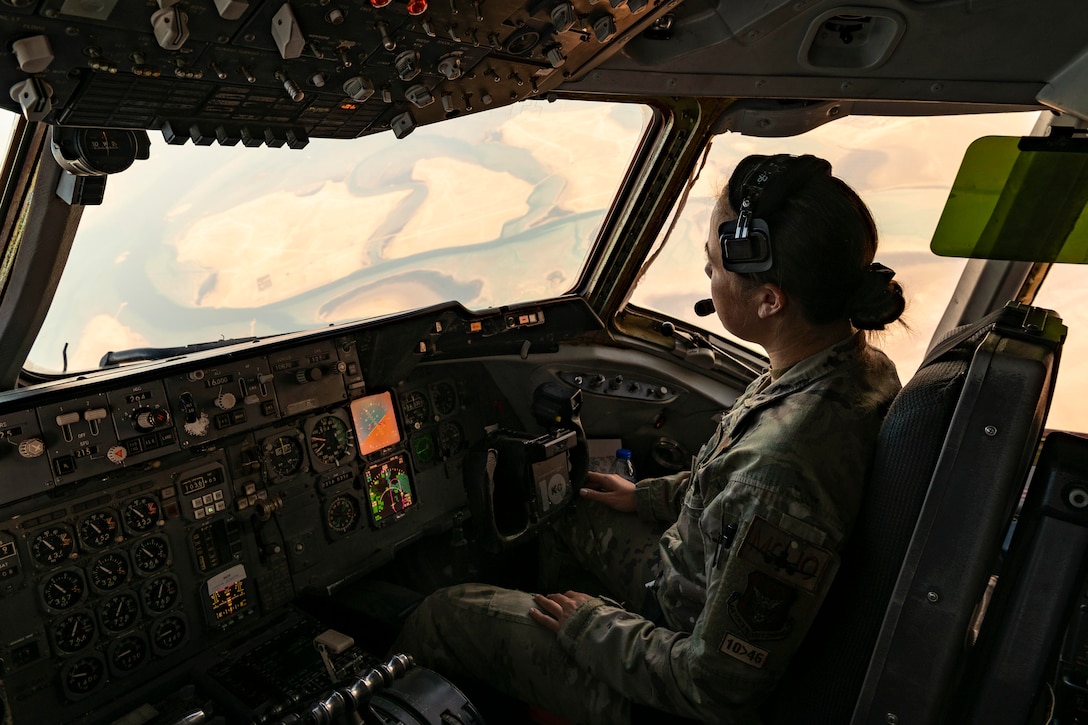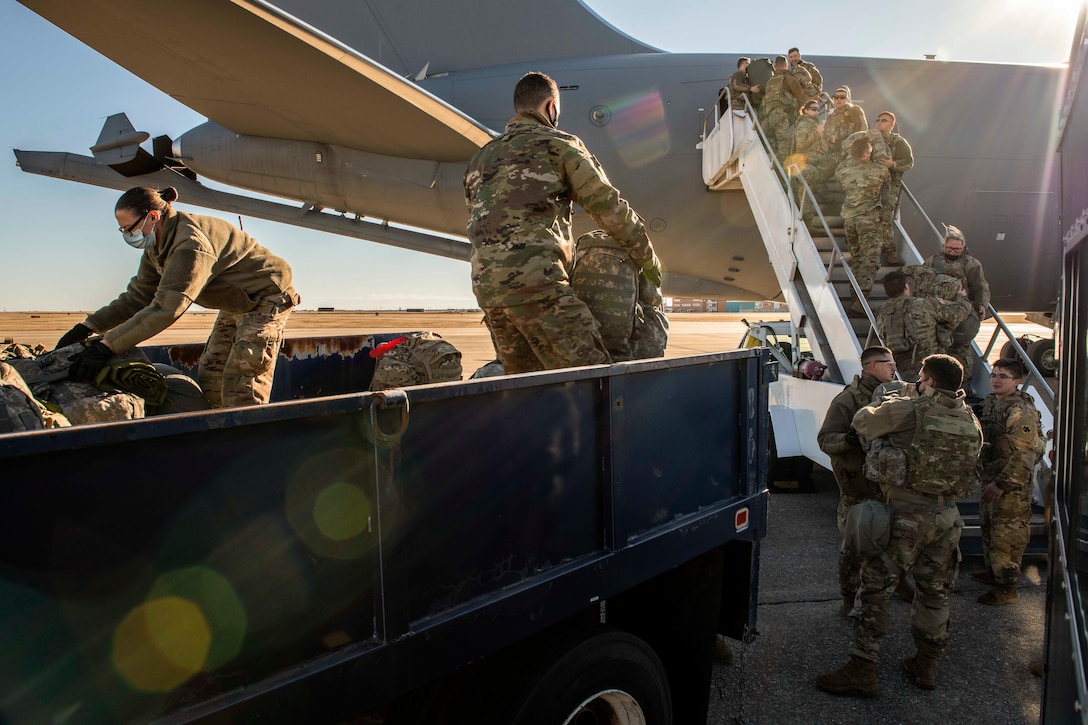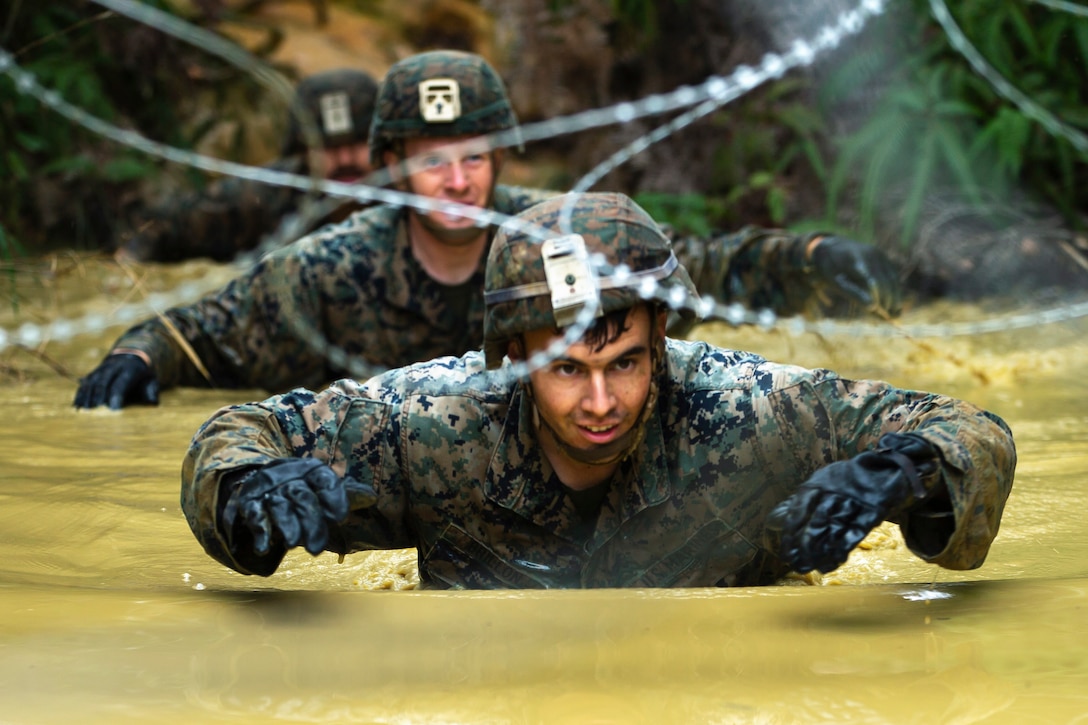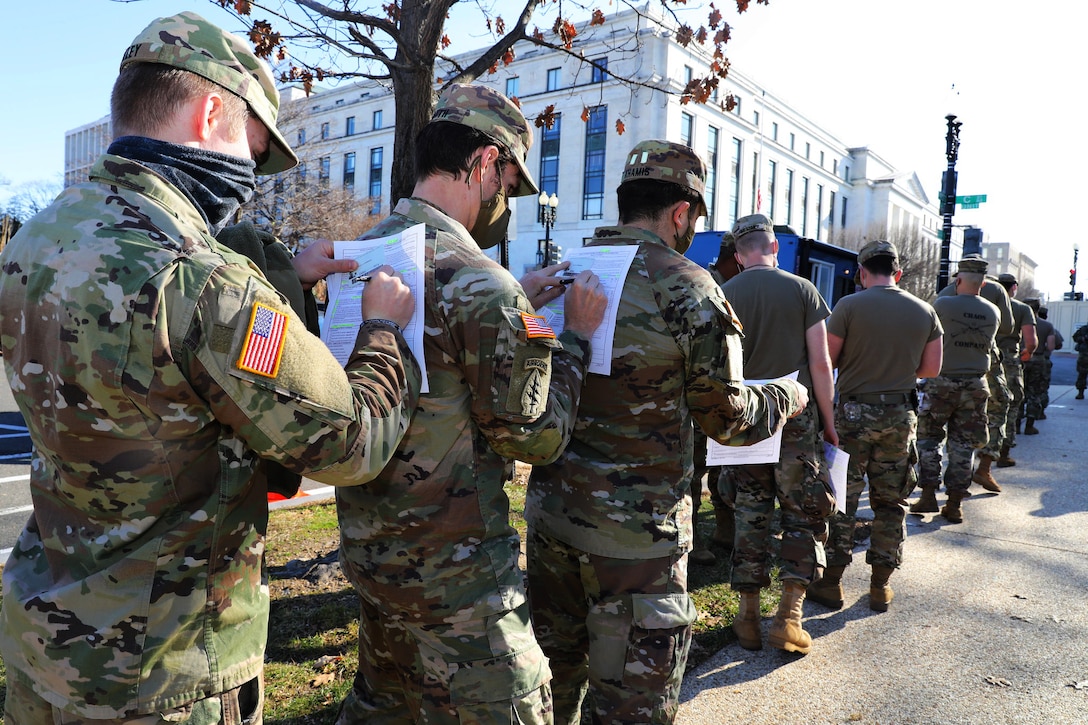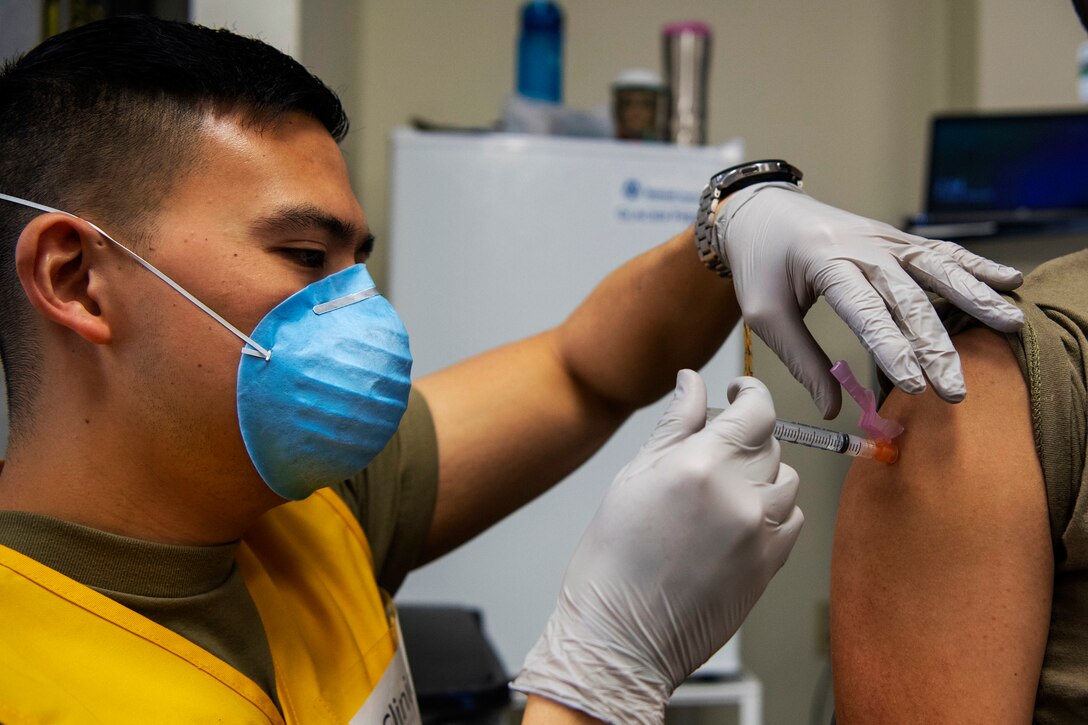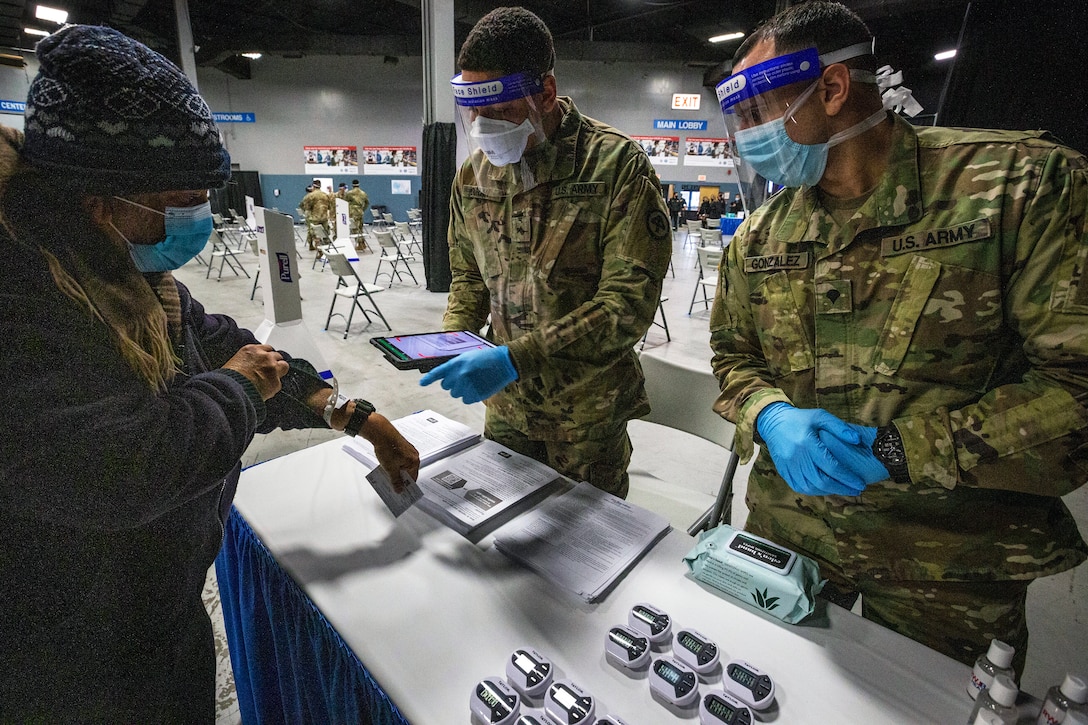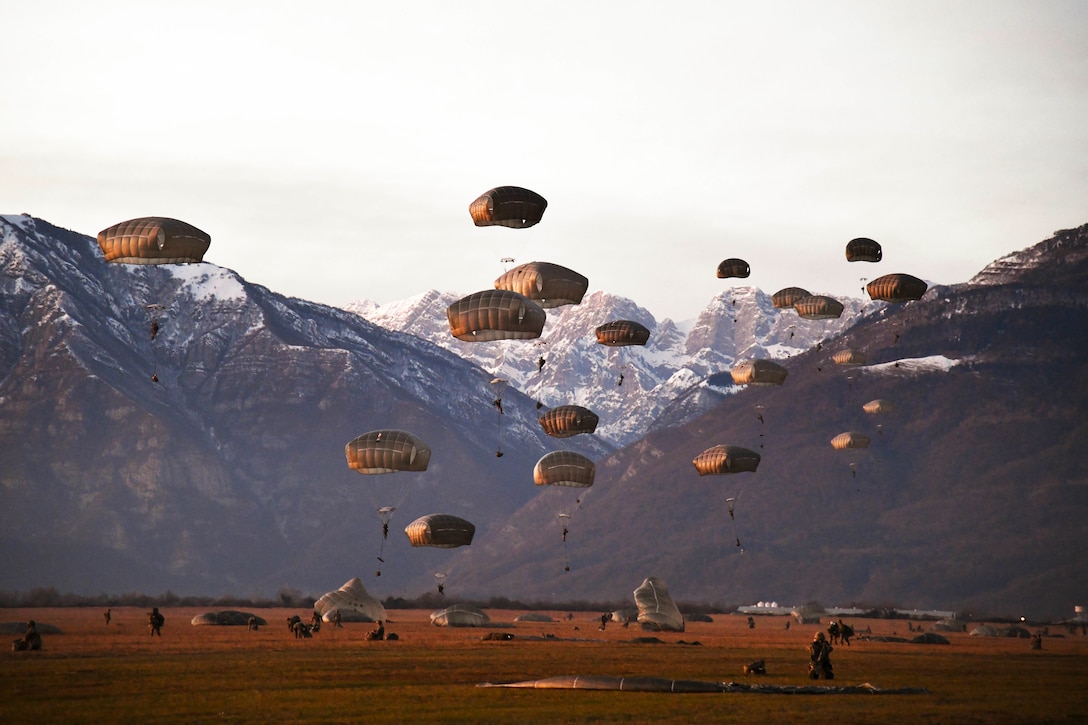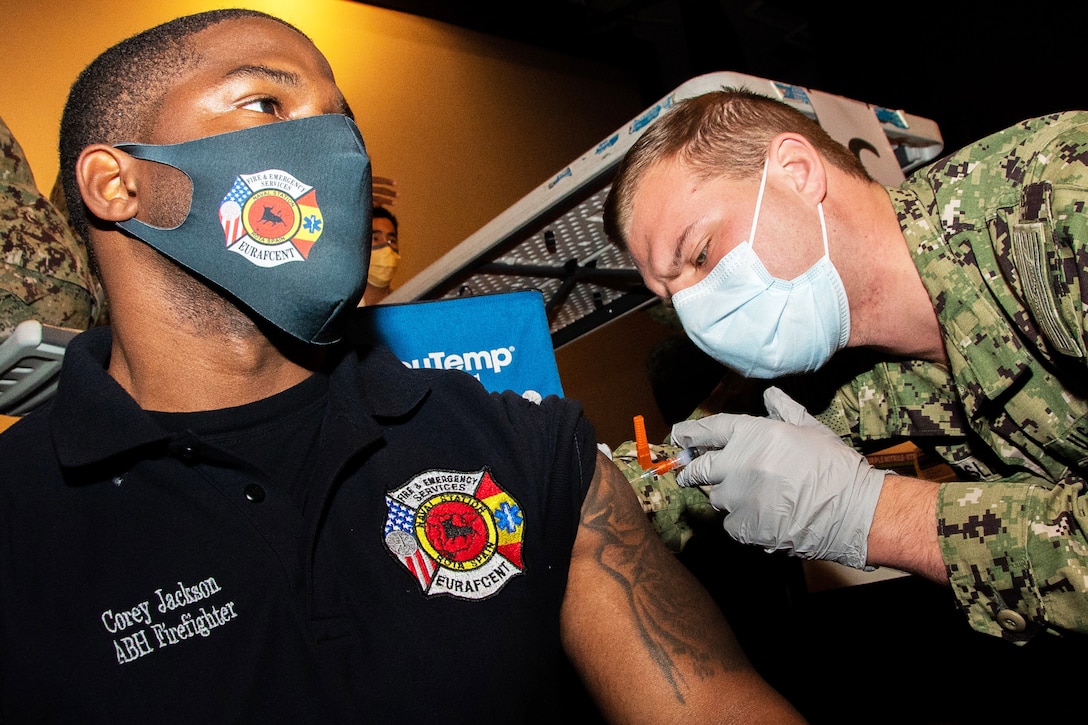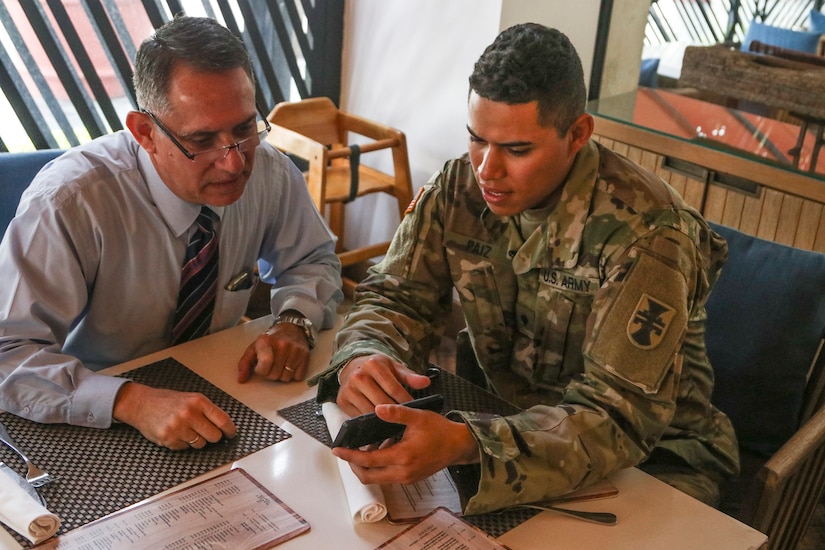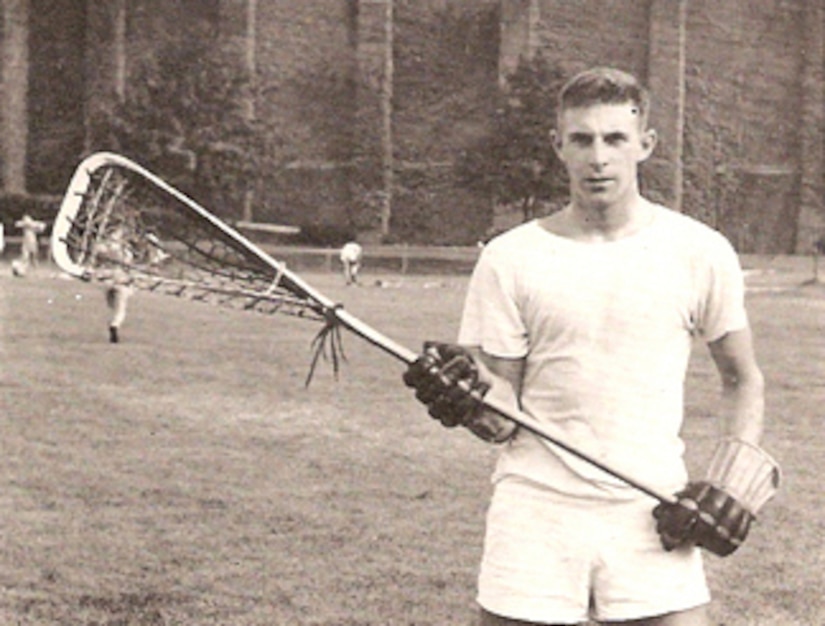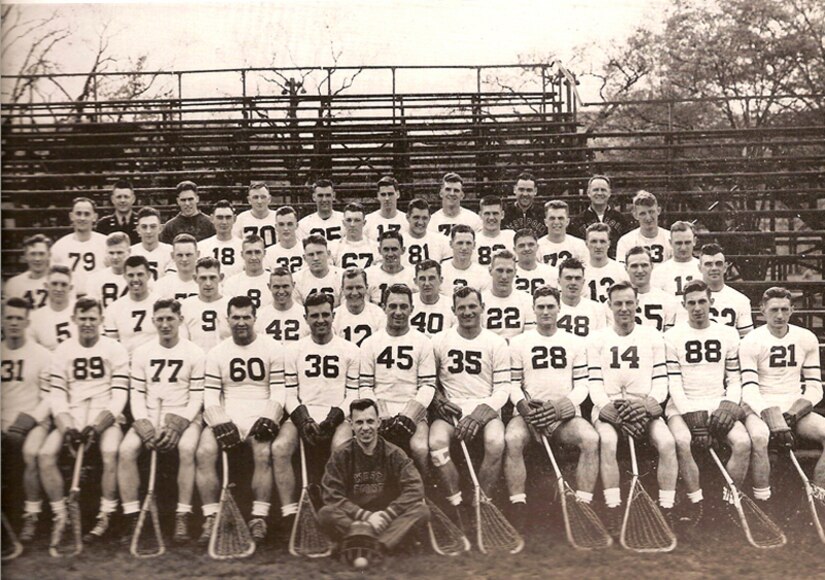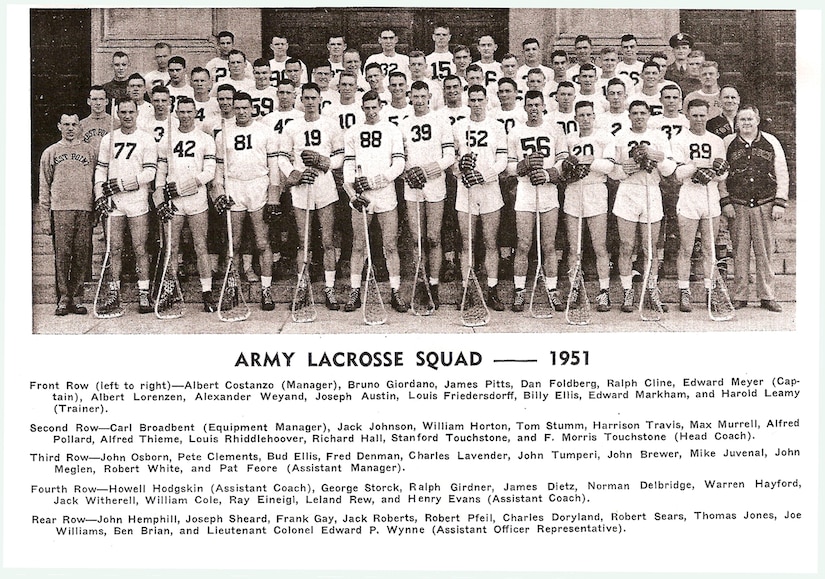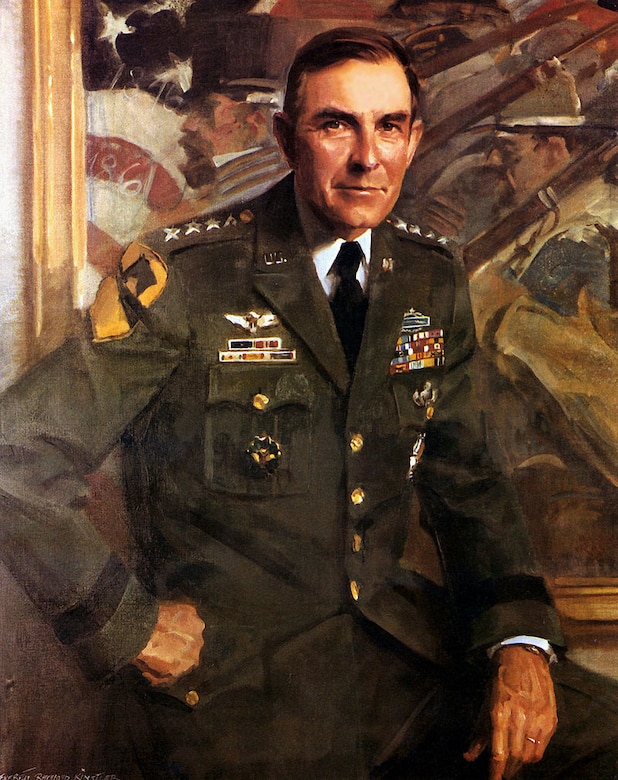Jan. 19, 2021
Jonathan Rath Hoffman, Assistant To The Secretary Of
Defense For Public Affairs; Thomas Muir, Washington Headquarters
Service; General Daniel R. Hokanson Chief, National Guard Bureau
ASSISTANT TO THE SECRETARY OF DEFENSE JONATHAN RATH
HOFFMAN: All right, good afternoon, everybody. Thank you all for --
for being here today so that we can provide you with some additional
information regarding events taking place tomorrow.
With me today are Tom Muir, the director of Washington Headquarters
Services, and also the -- the lead for the Department of Defense
transition team. And then General Dan Hokanson, the chief of the
National Guard Bureau.
I want to thank them both for being here today on what I imagine is
likely one of the busiest -- if not the busiest -- days of their
careers, as they both prepare for events tomorrow.
In just a moment, Mr. Muir will provide an update on transition
planning activities to include activities taking place tomorrow on --
and including the continuity of command here at the Pentagon.
Following that, General Hokanson will provide an update on security
efforts in the National Capital Region ahead of tomorrow's inauguration
as well as efforts with the National Guard around the country and in the
following days.
I have no other announcements, so we'll just go ahead, Tom?
DIRECTOR OF WASHINGTON HEADQUARTERS SERVICE MR. THOMAS MUIR: Good afternoon, ladies and gentlemen.
Thank you, Jonathan.
As Jonathan mentioned, I'm Tom Muir, director of Washington
Headquarters Services. And for the purpose of this discussion, the
agency transition director for the Presidential Transition Act support
from the Department of Defense.
I can tell you that we are prepared to receive the agency new
administration appointees beginning tomorrow at noon. We believe we're
going to onboard a significant number of their political appointees the
very first day, on day one, and get them straight to work in their new
offices.
That includes -- we did virtual onboarding, obviously, due to COVID.
We are processing their identity cards, their background
investigations, their security clearances all virtually.
They'll receive their common access credential tomorrow afternoon.
When they arrive at the Pentagon, they'll be met, concierged into the
parking space, brought into our Pentagon Library and Conference Center,
onboarded, their final documents, issue their common access credential,
their I.T. access, their e-mail addresses on both unclassified and
classified systems, and shown to their new offices.
They'll meet their teams, they'll be present in the offices --
particularly the front offices supporting. A number of these officials
who are coming in are non-career senior executives, not Senate-confirmed
but political appointees, and what we call Schedule Cs, or special
advisers, or senior advisers to several of our DOD leaders.
I can announce, on behalf of the Biden administration -- we checked
with them -- that the acting secretary of Defense, as of noon tomorrow,
will be David Norquist, our current deputy secretary of Defense. The
acting secretary of the Army will be John Whitley, once again at noon on
-- tomorrow, on the 20th. Acting secretary of the Navy, Tom Harker,
and the acting secretary of the Air Force, John Roth.
We also are working on and will publish soon an acting and a
performing the duties of transition plan that has career senior
executives filling in for incoming political appointees until such time
as they either are confirmed and complete the nomination and
confirmation process, or until they arrive in the Pentagon and onboard
for those non-Senate-confirmed positions.
So we have a career senior executive acting or performing the duties
of in all of our positions minus the four that I just mentioned: the
secretary of Defense, secretary of the Army, secretary of the Navy, and
the secretary of the Air Force.
Reference to transition, we are wrapping up our support to the Agency
Review Teams. In support of that effort, we completed 231 interviews
with 656 officials, and they've officially canceled kind of the
remainder of the interviews because we're going to discuss that during
our onboarding processes and when they meet their new teams.
The same for requests for information. We completed over 90 percent
of the requests for information, and those which we have not yet
completed, they'll roll over, once again, to the new discussions with
the new administration members when they join the team tomorrow.
As you can tell, we are still practicing COVID mitigation efforts.
The Biden-Harris team, of course, will lead those efforts here in the
Pentagon, effective noon tomorrow. I can tell you that all the senior
leadership is properly in place to execute both the National Defense
Strategy and meet the DOD global commitments as we welcome the new Biden
administration team to the Pentagon tomorrow afternoon.
That completes my opening remarks.
MR. HOFFMAN: OK.
General?
CHIEF OF THE NATIONAL GUARD BUREAU GENERAL DANIEL HOKANSON: Good
afternoon. I'm General Dan Hokanson. I want to thank you for the
opportunity to highlight your National Guard soldiers and airmen.
As I speak, more than 25,000 National Guard men and women from all 50
states, three territories, and the District of Columbia are here in
support of the lead federal agency for the presidential inauguration.
I visit with these men and women every night, and they understand the
importance of this mission. They're also proven, prepared and proud to
do their part to ensure a peaceful and safe inauguration for our 46th
commander in chief.
They are providing security, communications, logistics, and
coordination support to local and federal law enforcement, and have met
every request promptly and professionally.
Looking across the entire National Guard, we have over 91,000 on duty
today, to include 22,000 supporting COVID-19, 16,000 deployed overseas,
and over 6,000 protecting key infrastructure and capitol buildings in
30 of our states. Although 91 is a lot -- 91,000, it's less than 20
percent of your National Guard, so we have additional capability if and
when needed.
Upon completion of the inauguration, we will continue to support
federal law enforcement as requested, and our service members will
return home as soon as conditions permit.
With respect to comments about extremism, let me be clear: Extremism
is not tolerated in any branch of the United States military. If there
are reported issues, our leaders will address them immediately in
accordance with established department policies, and in coordination
with law enforcement.
With respect to the arming of the National Guard, the authority rests
with the secretary of the Army and is based on their mission, close
coordination with the support of law enforcement agency, and the chain
of command, which is commanded by Major General William Walker of the
D.C. National Guard.
Our ability to move 25,000 soldiers and airmen to D.C. from every
state and territory in less than two weeks would not have been possible
without the support of our governors and their adjutants general. It
speaks volumes about America's investment in the National Guard, and,
most importantly, the support of our service members and what they get
from their family and their employers.
Also, the outpouring of support to our National Guard across the
entire country and here in the District is a story in itself and I
wanted to particularly thank the citizens of the District of Columbia.
With that, I look forward to your questions.
MR. HOFFMAN: All right, we'll -- if you have questions, just please
identify who you'd like to have answer them. It's going to be a -- a --
kind of a COVID-safe dance over here to -- with -- just to get one more
podium.
So we'll go first to -- to Lita, AP.
QUESTION: Hi, Jonathan, thanks -- thanks a lot. This question is
for General Hokanson, but Jonathan, if you want to weigh in at all,
that'd be great. General, I know you mentioned extremism. What can you
tell us about the approximately a dozen or possibly more National Guard
members who have been pulled off duty because of either posts on social
media or other issues? How big of an effect do you think this is? Do
you think there are more? And frankly, any details on this that you can
provide I think would -- would be -- would be good since obviously the
general public is listening and watching this event with -- with great
concern. Thank you.
GEN HOKANSON: Lita, thank you for that question. And so we work
very closely with law enforcement and if there's any identification or
anything whatsoever that -- that needs to be looked into, out of an
abundance of caution we automatically pull those personnel off the line
and make sure that they're not part of the mission set, and in certain
cases we make sure that we get them sent home.
But we're in very close coordination also within our organization.
We're kind of a family in the National Guard, we grow up together, we
work together, and we keep an eye on each other, and if there's any
indications, we immediately address it, through the chain of command or
law enforcement, the appropriate level of agency, but I'm not concerned
as a large part of our organization -- if you look at 25,000, we've had
12 identified and some of those, they're just looking into. It may be
unrelated to this, but we want to make sure, out of an abundance of
caution, as I stated earlier, that we do the right thing until that gets
cleared up.
MR. HOFFMAN: And so Lita, I -- I don't want to get into the actual
vetting and -- and what partner organizations have found but much of the
information is -- is -- as the General mentioned, is unrelated to the
events taking place at the Capitol or to the concerns that many people
have noted on -- on extremism.
These are vetting efforts that identify any questionable behavior in
the past or any potential link to questionable behavior, not just
related to extremism. But as General Hokanson mentioned, we're -- we're
not -- we're not asking questions right now, we're not asking questions
of people who are flagged, we are, out of an abundance of caution,
taking action and immediately removing them from -- from the line of
duty at the Capitol and the events taking place and then we will address
them, whether it's through law enforcement, if necessary, or through
their own chain of command.
But the point here is that we have the vetting processes that are in
place, we also have, as General Hokanson mentioned, internal to the
ranks, as well -- people have made it clear that if you see something,
you should -- you should raise it. We are taking steps to -- to ensure
that there's no -- no concerns. The American people should have
confidence in the National Guard, they should have confidence in the law
enforcement teams that are planning for this inauguration and ensuring
that Vice President-elect – or President-elect – Biden has a safe and
secure inauguration tomorrow.
OK? Jennifer?
QUESTION: Just to -- to follow up on Lita's question, General
Hokanson, you are confirming that there are 12 people who have been
removed from National Guard duty. There are reports that two of those
were linked to so-called right wing militias. Can -- are you confirming
that as well right now?
GEN HOKANSON: All I would say with -- with those two individuals is
inappropriate comments or texts that were put out there. And as we
stated, just out of an abundance of caution, we want to make sure that
-- that there's no issues at all and that those properly get looked
into.
QUESTION: And just in terms of generically, in the -- in the future,
will this be sort of a standard kind of -- I mean, in the past, were
you allowed to look at people's social media pages and things that they
were texting or is this new to this inauguration or is this an ongoing
thing that the National Guard has been doing?
GEN HOKANSON: So I'd have to defer to the FBI cause they do the --
the -- the vetting once our personnel are here but as I mentioned
before, you know, we're a -- we're a close knit organization and we keep
an eye on each other and if anything doesn't seem right, as Jonathan
mentioned, if we see something, we're going to go ahead and report it.
QUESTION: Did those individuals come to Washington and were sent home, or they were not allowed to come to Washington?
GEN HOKANSON: In those cases, they were both here in Washington or -- and are being sent home.
QUESTION: OK.
MR. HOFFMAN: All right, we're going to move on. Helene Cooper, New York Times?
QUESTION: Hi. I'm still -- I'd like to go back to the -- continue
on with those 12. Are you saying 12 were removed because you had
concerns of ties to extremist organizations?
MR. HOFFMAN: No, that is -- that is not it. I think as General
Hokanson mentioned, we have two individuals that identified -- had made
inappropriate comments or texts. Those two individuals were removed;
I'll note, one of those was flagged by -- by -- within the command --
and then we have another group of individuals that have been flagged in
the vetting process for a number of different reasons -- like I said,
unrelated to the events here and -- and the concerns that most people
have posited. It's -- it's a -- it's a lot of looking back at anything
that could potentially flag in a criminal history check, anything that
could come up in a civilian database that's being scrubbed by our
partners.
We're just not -- like I said, we're -- we're not taking any
chances. Anything -- flags -- if there's any -- any reason that
somebody's name is brought to the attention of the command, they're
being removed from the line; we'll ask questions later and we will --
and -- and can -- ascertain whether any action needs to be taken by
either law enforcement or by their chain of command.
But no, we're -- we are not saying that all 12 are -- have been
pulled for -- for ties, I think as you characterized it, to extremists
or militias. That is not correct, OK? All right, keep ...
(CROSS-TALK)
QUESTION: ... second question. Of the 25,000 National Guard troops
coming, how many of those are military police, please, for General
Hokanson?
GEN HOKANSON: I apologize, I don't have the exact number of military
police but we use an assortment of military police and security forces,
and that's a balance between state requirements and what they're able
to send here, but we can follow up with the exact number at a later
time.
MR. HOFFMAN: OK, we'll keep going. Dan Lamothe, Washington Post?
QUESTION: Yes, thanks for your time today -- today. I wanted to
clarify what the threshold is for someone to be flagged here. For
instance, if someone had a QAnon bumper sticker or t-shirt or something
like that showing some amount of sympathy or interest, is that enough or
does it take something more serious? Thank you.
MR. HOFFMAN: So I -- I don't want to speak for the -- the vetting
that's underway, but if our law enforcement partners flag an individual,
based on their determination that they see something and they pass it
to us, we're not even asking what the flag was, we're just removing
them. So I can't speak for that.
Within the ranks, I think that it's what we've seen as -- as
inappropriate comments and text had been it. I don't think that we have
a -- a handbook on -- on what are thresholds for -- for
inappropriateness at this point. We are just taking action against --
action to remove individuals if there is some indication that would
indicate that they should not be here at this time.
OK, Phil Stewart, Reuters.
QUESTION: Yeah, hi. So I just -- not to beat on a -- a dead horse
here, but the -- the 12 people that were removed were removed after
vetting, but the -- but the vetting was not necessarily for extremist
groups, as I think I -- I had thought; that they were -- the vetting was
for -- for ties to extremism. So I guess that -- so if that's true,
then what is the -- is the vetting more broad than that? Are you
looking into whether these people have, like, you know, big debts and,
you know, other things that could allow and be compromised by a -- by a
foreign adversary? I -- I'm a little confused about -- I thought this
vetting was for extremism.
And then -- and then secondly, the two people that are removed from
the Capitol, they're not part of the 12. So it'd be 12 plus two,
correct?
GEN HOKANSON: No, that's not true. So there's -- there's 10 that
were identified by the FBI, and I -- and I can't speak to the level of
vetting that they do, but I know it's -- they said it's a standard they
do for all inaugurations for participants.
With the other two, they're separate from those 10, for a total of
12. One was identified by the chain of command, and another was
identified through anonymous reporting.
MR. HOFFMAN: And -- and Phil, to the first part, our understanding
is that the -- the review and the vetting is broader. As you indicated,
we're -- we're not just looking for ties to -- to one particular threat
stream; we're looking for any indication that an individual should not
be included in the inaugural events.
MR. HOFFMAN: All right, David Martin, CBS.
QUESTION: I have no question.
MR. HOFFMAN: OK. Sylvie, AFP.
QUESTION: Yes, hello. I would like to go back to the reason why
there were flagged -- the two were flagged. You mentioned inappropriate
comments or texts. Were these comments of a political nature?
MR. HOFFMAN: We're -- we're not going to get into what the -- the
comments and texts were, other than to say that they were inappropriate,
and they -- they've -- they rose to the level that, in one case, the
chain of command flagged them and made a determination to remove them,
and in the other case, that there was a, as General Hokanson mentioned,
a -- a -- a comment posted -- or sorry, a -- a comment provided over a
tip line that when their chain of command was made aware of it, they
decided to remove him. But we're not going to get into the specifics of
what the comments were right now. There'll be time for that.
Warren?
QUESTION: Given that the -- the issues that were pulled or the
issues that were flagged are not related to two weeks ago, a week and a
half ago, are you concerned that your own background screening didn't
pick this up?
MR. HOFFMAN: For -- for which individuals? For the -- the broader...
QUESTION: Any of the 12.
MR. HOFFMAN: Well, I -- so I -- I don't want to get into the -- the
exact vetting that's undertaken. My understanding from -- from what has
been explained to me by law enforcement partners is that some of the
information that -- that would flag an individual is not necessarily
information that would, if pursued, would lead someone to understand
that a person's committed a crime or as someone who is -- is
compromised. But it is just, it's a piece of information, and at this
point in time, we don't have the -- the -- the timeframe in which to run
down every single piece of information and determine whether that --
that individual may not -- should not be a part of the military or not,
but it's enough information right now that just that flag alone, we've
determined that that is enough to remove them from the Capitol.
QUESTION: And do you, at this point, know how many of the FBI has gone through of the 12?
MR. MUIR: No, I don't have that information for you. Sorry.
Luis ?
QUESTION: Two questions for you, General, and to Jonathan. What
happens to these individuals when they go back? I mean, you've caught
them. Is -- is this something that triggers disciplinary action or
something else like that? That's first. And then secondly, can you
talk about the -- the follow-through mission? Tomorrow is the
inauguration. You're going to have all of these personnel in town. How
long do -- do you intend to keep them for? Is there a plan that this
is an extended mission? And -- go ahead.
GEN. HOKANSON: So thank you, Luis. So with respect to the first
question, so obviously, once that's -- those folks are identified, we'll
make sure that we follow through with either law enforcement or the
chain of command, which is ever the appropriate venue, until we get
exact resolution on each and every one of those individuals.
With respect to the mission after the inauguration, and so we brought
on 6,200 for 30 days. On June -- January 7th, and so they'll go into
February. And that number can go up or down, depending on the lead
federal agency requirements or federal law enforcement requests. But
really, after the inauguration, we'll look at the conditions and the
environment and the mission set that we're asked to perform, and if that
is below the number of personnel that we have, then we'll start
identifying those folks to get them home as -- as quickly as possible.
QUESTION: And so the drawdown could occur rather quickly then?
GEN. HOKANSON: Absolutely, and that'll be conditions-based, but yeah, it could be quick or it could be over time.
MR. HOFFMAN: And as the general mentions, we're -- we're in support
of federal law enforcement right now. NSSE is -- Secret Service has the
lead past the inauguration. That may continue for a period of time,
but then other federal law enforcement will have that lead and -- and we
will still be supporting them.
I'll just remind everyone on the phone that we have another very
capable, talented senior executive here, Tom Muir, who's available to
answer questions and -- on the inauguration that you've been hammering
us to answer over the last few days. So he -- he's here, if you have
anything.
Tom Vanden Brook, USA Today?
QUESTION: Sorry, Jonathan, nothing here.
MR. HOFFMAN: Dan De Luce, NBC?
QUESTION: Yeah, thanks. You just -- this is such a large force here
for the inauguration. How confident are you that -- that you and the
federal government and the FBI have been able to properly screen and vet
all of these troops? Do you think this is obviously not a -- a typical
situation?
GEN. HOKANSON: Well, in this case, we're working very closely with
the FBI, and I know that we've been providing all the information they
need as our -- our troops show up into the national Capitol region, and
I've been assured that they'll get all the vetting complete.
MR. HOFFMAN: Yeah. I mean, the -- the Secret Service handles large
events on regular basis in which they are -- are able to -- to screen
and -- and vet attendees. The FBI handles events, as well. We have
continuous vetting and screening going on within the department. This
is obviously an unusual situation in which it is all hands on deck, and
we're leaving no stone unturned. But we here are confident that there
will be no opportunity to identify any potential threat left done.
And so we're going to do all we can. We're going to partner with the
Secret Service and the FBI and others to ensure that we are all doing
everything we can. We're all rowing in the same direction, and that is
to ensure that the president-elect and the vice president-elect have a
safe and secure inauguration tomorrow at 12 noon.
All right, Jeff?
QUESTION: Thank you. I -- I was just following up on one of my
colleague's questions. You had said there'll be a later time to
describe the type of texts and messages that these two service members
sent. Isn't now the time? This is the largest news story in the
world. Can the Defense Department at least characterize the texts or
communications that these two National Guardsmen sent? Were they
plotting against vice -- President-elect Biden? Were they threatening
violence? What exactly were they saying?
MR. HOFFMAN: So I'll -- I think the general's characterized, and
I'll characterize them. They were inappropriate texts. There's going
to be a -- a continued look at this, and whether that is a internal DOD
look within their chain of command or a investigation by others is -- is
something that's being determined. So it -- I -- I don't want to get
ahead of that investigation and get in the way of that. We're providing
information here to the American public.
What's important for them to know is that those individuals have been
removed, they will not be at the Capitol. And if we uncover anyone
else with sending inappropriate messages or has flags that have been
identified by our law enforcement partners, they will be removed as
well.
QUESTION: Well, I appreciate that you're doing everything you can.
But in this case, it almost sounds like the Defense Department is trying
to hide this. What is it that they -- can you say? Did they threaten
President-elect Biden or Kamala Harris? Can you at least rule that out?
MR. HOFFMAN: Jeff, once again, I'll say that we have an ongoing
investigation into it. I will share that the comments were
inappropriate, and the individuals have been removed and the appropriate
authorities will continue to investigate.
All right, we'll do a few more.
Tara Copp, McClatchy?
QUESTION: Hi, Jonathan, thank you for doing this.
My question is for General Hokanson, is, do you think that there will
be a need for an overall rescreening of all Guard members, moving
forward, since this kind of re-vetting for the inauguration has popped
up a few concerning things?
And how would you go about doing that? It seems like it would be
extremely difficult, given the dual role, civilian-military, and the
need to do what you've characterized before as kind of a constant
monitoring? Thank you.
GEN HOKANSON: Thanks, sir.
I would say with respect to the current processes that we have and
policies, that we'll continue to do those. And also really looking
across the chain of command and their coordination with their soldiers
and airmen at every level.
But I don't see any -- any current change in policies. If there are,
obviously, we'll enforce them, but I think the policies are already
there in place, and we'll continue to utilize those to identify any
concerns that we might have.
MR. HOFFMAN: Abraham, Washington Examiner?
QUESTION: Yeah, I just wanted to get clarification. Thanks a lot
for calling on me. Wanted to get clarification of that 6,600 number for
30 days that -- can you kind of break out? There's 25,000 Guard
members in -- providing security in the Capitol right now. That
number's going to drop down to 6,600 only they -- yeah, I'll let you
clarify that, thanks.
GEN HOKANSON: So with respect to the 25,000 that we currently have,
that's to meet all of the requirements that have been requested by the
lead federal agency -- in this case, the United States Secret Service.
And so that's the amount that they required for the inauguration.
When we look post-inauguration, it'll depend on the conditions and of
course the missions that were provided, but we did put 6,200 on early
so there would at least be a residual element here if it was necessary.
And now, as we go into the days following from here, we'll stay in
close coordination with all the federal law enforcement agencies to make
sure that we meet their requirements but if we have excess capability
and capacity, of course, we want to get those soldiers and airmen home,
back home to their families and employers as soon as we can.
MR. HOFFMAN: All right, Meghann?
QUESTION: I don’t have a question.
MR. HOFFMAN: OK.
Jennifer?
QUESTION: Just a quick follow-up, sorry, sir. There's also a report
that -- that there was chatter among QAnon websites suggesting that
some QAnon members wanted to put on National Guard uniforms, and that
there was concern about that. And that there's also concern that
National Guard are concerned that people are taking videos and pictures
of them at the Capitol.
Can you address that? Is that accurate, was there a law enforcement
warning about somebody wanting to put on National Guard uniforms?
GEN HOKANSON: Absolutely. We're in close coordination with the FBI
and any and all things that they come up with that may be of concern, we
share that across our force. Because we want to make sure that no
matter what situation we're in, our soldiers and airmen are prepared and
ready to complete their mission -- really, to protect people and
property and also be able to defend themselves.
QUESTION: But you're confirming that there were concerns about those...
(CROSSTALK)
GEN HOKANSON: Yes, there are always concerns about stuff like that
and we just work with the law enforcement agencies because they provide
that information. And if we see indications of anything that doesn't
look right, we report it immediately.
MR. HOFFMAN: OK. All right, I will -- Tom, I apologize for -- for
-- for dragging you down here, but thank you for coming. Tom's got a
busy day tomorrow, has a great plan in place. We've been working
closely with the Biden team.
As you guys know, my -- my relief will be here tomorrow at 12:01
p.m., so looking forward to getting him on board and getting him up to
speed. And next time you guys are in here, he'll be -- he'll be the one
briefing you. So I know that'll be a -- he will do an incredibly good
job at that, as he has always done.
So I just wanted to take a moment to thank all of you who cover the
Pentagon. What you guys do is important. I've enjoyed almost all of
our conversations over the past two years. I have been privileged to
speak to you guys from up here and I really do appreciate the work you
do, it's important.
I want to thank the DOD Public Affairs teammates for their effort in
sharing the good work of the Department. I also want to thank those
career military/civilian civil servants, such as General Hokanson and
Tom Muir, for all they do to make this a great institution.
And finally, given all the country has been through recently --
importantly, with COVID, civil unrest, and the attack on the Capitol on
January 6th, it's important to note that in times of hazard, the
American people continue to turn to for assistance the most great
American -- the most trusted American institution, which is the U.S.
military.
So at a time when a lot of institutions --and so many of them -- are
under assault, the credibility, transparency, and integrity of the
Department of Defense should be prized and husbanded. The men and women
in uniform at DOD are among the best among all of us.
And while we all do not want to find ourselves in times where the
nation continues to need DOD to be a rock for civil society, we're here
and we'll continue to perform that role and be capable of being such.
But hopefully that time will pass soon. And when that does, we'll
return our focus to our mission and our foreign adversaries who have not
been distracted one bit.
So with that, take care. Get yourselves vaccinated. And hopefully we'll see you guys again soon. Thanks.
